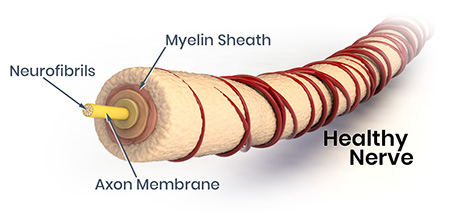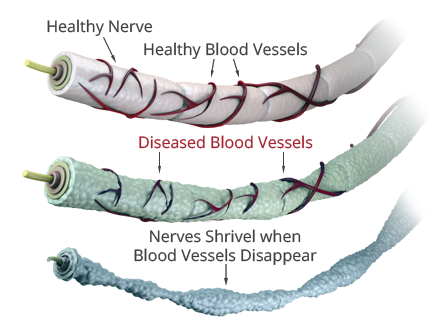Neuropathy Has Many Causes
Patients come to us with all types of peripheral neuropathy. Neuropathy is typically found in patients with diabetes, medication side effects, circulatory problems, and certain vitamin deficiencies. The potential causes are many and sometimes there is no clear risk factor for neuropathy. Regardless, our first step is to evaluate your specific case at our no obligation consultation to determine if it is a type of peripheral neuropathy we can help. If so, the prognosis is generally favorable and treatment time is predictable. Your neuropathy pain may be significantly reduced or possibly eliminated without serious side effects or potential dependency on medication in as little as six weeks.
NO MORE Pain, NO MORE Numbness, NO MORE Tingling and NO MORE Burning!
Most patients begin to sleep better, walk with ease, return to normal activities and start enjoying their lives again!

Neuropathy is a condition of the nervous system that typically causes numbness, tingling, burning, aching, and a variety of other symptoms. Many patients also report experiencing restless legs or throbbing, cramping pain in their hands or feet.
Neuropathy can result from problems such as traumatic injuries, infections, metabolic problems and exposure to toxins. One of the most common causes is diabetes.
Poor blood circulation may also be a major contributing factor that leads to neuropathy. Diabetics are especially susceptible to neuropathy due to the damage high sugar levels may inflict on the small vessels responsible for delivering blood to the nerves. High glucose levels are believed to adversely affect the amount of oxygen provided to the nerves thus leading to neuropathy.
Peripheral Neuropathy occurs when nerves in the extremities are damaged or destroyed. Like static on a telephone line, this interrupts the normal communication between the brain and the skin, muscles and other parts of the body. This condition predominately affects the peripheral limbs (legs, feet, arms, and hands).
Peripheral neuropathy distorts and sometimes interrupts messages between the brain and spinal cord and the rest of the body.
It is estimated 20 million people in the United States have some form of Peripheral Neuropathy.

Peripheral neuropathy can result from problems such as traumatic injuries, infections, metabolic problems and exposure to toxins. One of the most common causes is diabetes.
Poor blood circulation may also be a major contributing factor that leads to neuropathy. Diabetics are especially susceptible to neuropathy due to the damage high sugar levels may inflict on the small vessels responsible for delivering blood to the nerves. High glucose levels are believed to adversely affect the amount of oxygen provided to the nerves thus leading to neuropathy.
Neuropathy is a progressive condition, meaning it tends to get worse with time. If left untreated for too long, the nerve damage can reach a point where there is simply nothing that can be done. This is why early detection and treatment of peripheral neuropathy is critical to getting the best results.


Neuropathy Pain Help
The Doctors and staff at the St. Augustine Spine Center are excited to help you improve your health and reach an active lifestyle. Please enter info below.
Schedule your no obligation consultation today!
Call 904-429-7750
*Due to federal law, some restrictions apply to offer. Medicare rules apply.
©2023 St. Augustine Spine Center. All rights reserved. | Legal Notes | Privacy Policy | No Surprises Act